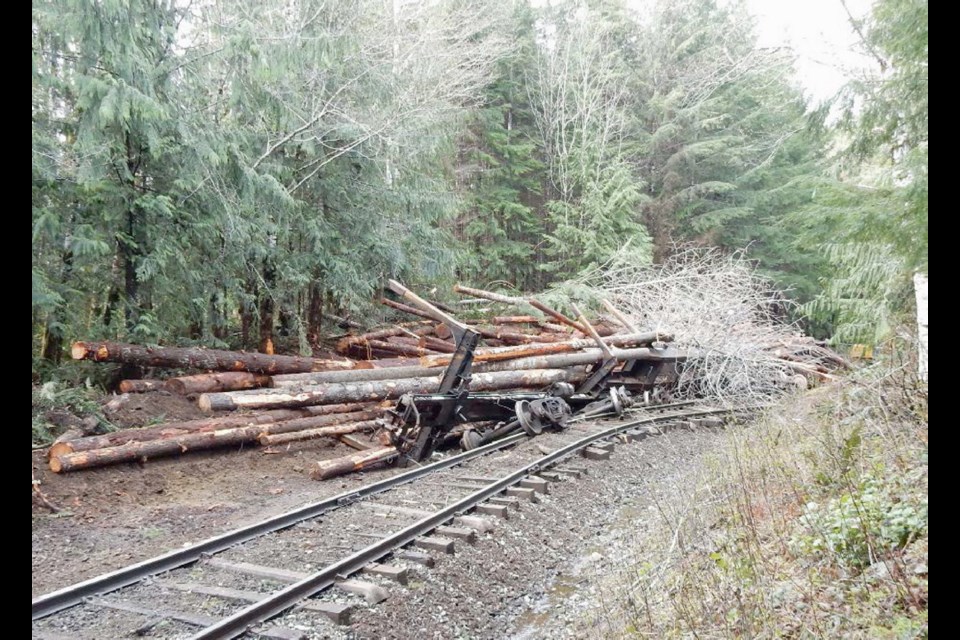Faulty equipment and a host of mechanical errors caused the 2017 logging train derailment in Woss that killed three people and injured two, WorkSafe B.C. has found.
A WorkSafe B.C. report obtained by the Times Colonist through a freedom of information request concluded that Western Forest Products, the company working on the now-defunct Englewood Railway, failed to ensure the health and safety of all workers on the rail line.
On April 20, 2017, a faulty coupler, the mechanism that connects rail cars, caused 11 cars loaded with logs to detach and roll freely toward the community of Woss, directly into a maintenance crew working downhill on the track.
The rail cars rolled 500 metres from the reload yard and collided with a railway maintenance car, called a speeder, and a rubber-tired backhoe where five men were working.
Four men were on the speeder, and one was on the backhoe.
The man operating the speeder tried to apply the brakes but to no avail. The railcars, the speeder and the backhoe ran out of control down the line for another 1.5 kilometres until they all derailed. The men were buried by logs as fellow logging workers and first responders worked desperately to free them.
Roland Gaudet, Jacob Galeazzi and Clement Reti died and two others were seriously injured.
Gaudet’s stepdaughter, Vanessa Kaspar, has read the report and is distressed by the findings.
“I want to know who was in charge of inspecting those things,” she said. “It’s frustrating to read that there was a lot of neglect that happened.”
The train would have derailed well before it reached the maintenance crew, but a derail mechanism wasn’t working properly. The device should have sent the wheels to the right, which would have derailed the logging cars without putting anyone in harm’s way.
However, the derail device was attached to old rail ties that had rotted away due to wet conditions. The derail device, instead of diverting the cars, came free when it was hit by the first set of wheels, making it useless. As a result, the rest of the wheels stayed on the tracks and the rail cars barrelled toward the maintenance crew.
The front wheels that temporarily derailed jumped back on the tracks when they hit a switch where two tracks converge.
The reload operator radioed the rail traffic controller to warn that the cars were rolling down the line, a warning which the controller broadcast repeatedly to anyone on that section of track. No one responded to those warnings and the WorkSafe report does not explain why.
“It’s like a series of three freak things happening,” Kaspar said. “Ultimately I don’t have a stepfather, my daughter doesn’t have a grandfather. She loved him so much.”
Gaudet, 59, had worked for Western Forest Products for 27 years and was one year away from retirement.
In a statement Tuesday, Western Forest Products said: “The safety and security of our employees has and always will be our number one priority. This was a tragic incident that will forever impact the families of those lost and injured, all of those who worked alongside them and our company as a whole. We continue to work to ensure that families, workers and all affected by this tragic incident are supported in any way we can.”
The company would not say whether it has paid compensation to any of the victims’ families or to the men who were injured, citing employee privacy.
Gaudet’s brother, Mike Gaudet, said the family has not received compensation.
“We’ll never get closure or answers,” he said.
The Transportation Safety Board also investigated and has not yet released its report.
Western Forest Products announced in November 2017 that it was shutting down the logging train, which was believed to be the oldest in North America and the last one operating. The train had been shut down since the derailment.
United Steelworkers Local 1-1937, the union representing logging workers, wanted to see Western Forest Products continue to operate the rail line after making safety improvements recommended by a joint safety committee.
“In our report we came up with a bunch of recommendations to make it viable, to make it safe again but they shut down the whole system which was frustrating to our membership,” said Chris Cinkant, the union’s safety officer.
David Rushton, Woss’s regional district director, said the closing of the logging train has been difficult for the community of 200 people. It amounted to a double blow after the derailment, he said.
“Of course it’s affected the community, it’s still something that’s on everyone’s mind,” he said. “It’s something that will always be there.”



